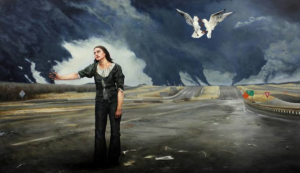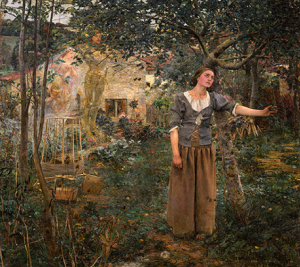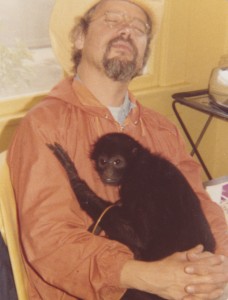“Manifest Destiny” by Michael Paul Miller
On the first Thursday of every month, Seattle’s Pioneer Square art galleries throw open their doors from 6 to 8 p.m. and hordes of art lovers rush in to admire (and often to buy) fresh works of art. Most galleries time their new exhibitions to open during these First Thursday Art Walks. Last night at the Linda Hodges Gallery I saw Michael Paul Miller‘s post-apocalyptic painting titled “Manifest Destiny” and was excited to recognize his inspiration right away. Take a look at Jules Bastien-Lepage‘s portrait of Joan of Arc:
Painted in 1879, it hangs in New York’s Metropolitan Museum of Art, and it has always been a favorite of mine for Joan’s pale-eyed, thousand-yard visionary’s stare and the barely visible images of saints in full armor floating above the ground and delivering their messages from behind her in the trees.
Michael Paul Miller’s “Manifest Destiny” clearly reverses this same visionary woman and shows her having a powerful experience that we can’t fathom, but it seems her destiny has become manifest before her. She grasps at a plume of smoke that originates far behind her but miraculously also appears to extend to the spot upon which she stands, seeming to indicate that she has an ability to reach into other dimensions, perhaps the future, perhaps the past, and to literally grasp things that others cannot. The destiny the title refers to is not the land of endless opportunity that 19th century expansionists envisioned when they coined the term “manifest destiny” and used it to justify their push westward across North American, smug in their belief that they were entitled to dominion over all the land’s riches. Instead, this seer stands amid the destruction and desolation left in the wake of those who “advance” by using their technology and greed to seize and destroy rather than to build, refusing to work within existing systems or integrate into the world around them.
I admire both the painting, difficult as it is, and the clever visual quotation within in it. Just as jazz (and classical) musicians often quote other compositions in their tunes, playing a quick riff that adds to the overall complexity of the piece and provides a fun in-joke to those in the know, artists often make reference to other artists’ works both in homage and to tease new meaning out of old tropes. It is this sort of technical skill and richness of symbolism that makes a study of art history so profoundly moving and rewarding.
My understanding of the history of art has enriched my life daily since I studied history and art history at Mills College decades ago. That is why I become upset when I hear people being so quick to dismiss art history degrees and castigate those of us who believe in the power and importance of exploring and understanding the creation of visual art. Even President Obama derided the attainment of an art history degree in a speech recently, joining in with many who seem to believe that any non-STEM (science, technology, engineering and math) or business-related major which does not lead directly to a $100,000+ annual salary in a technical field is inferior and unnecessary to our culture and economy. Some colleges are even considering dropping their art history classes because students feel that anything that doesn’t lead to a likely increase in their earning potential does not seem important. (And who can blame them when a private undergraduate college education can cost $60,000 per year, and most students need to find remunerative jobs ASAP upon graduation to pay back their crushing student loans?)
The facts that such artistic studies enrich their hearts and souls, help them to better understand other times and cultures and allow them to make connections among disparate subjects and styles mean nothing to arts denigrators, even though studies show that people with a well-rounded liberal arts education not only benefit from their STEM studies but also benefit from their studies of the arts, since those studies make them better writers, researchers and synthesizers of information, all of which are skills in great demand in more technical fields. Many articles on this topic are popping up in popular media recently, including this one from the Washington Post.
How shortsighted and indeed stupid it is to assume that arts are mere fillers meant only for bourgeois, time-wasting rich people! The same people who disdain art historians often pay thousands of dollars per year to buy video game consoles and new games to play on them, and they download films and go to action movies that they enjoy specifically because the visuals are arresting and meaningful. They spend hours online each week looking at animal videos or comedy sketches, hungry for quick impulses of emotion that come from enjoying endearing visuals that provide instant sensory gratification. Because visuals matter. The arts in general matter deeply to people even if they don’t always recognize this. People listen to three-minute long songs at work or in the car or while running because they know that the power of acoustic arts gives them a rush, inspires a feeling, changes their attitudes and makes them feel more connected to the world or to their feelings. These are all arts created by sensitive people who believe in the importance of following their aesthetic dreams whether or not that leads to monetary riches, and we are all better for it.
If you are tempted to denigrate artists or those who seek to better understand them (such as teachers of poetry or professors of ancient Indian statuary), remember that all of these arts and the appreciation of them are signs of mental and emotional advancement. They are the signs of a sophisticated civilization. They are the underpinnings of new thought, forms of expression and connections between people, times and cultures. These arts are what ancient civilizations (and the founders of the United States, incidentally) saw as signs of a great society. These are the fields of study that they believed proved that their cultures were truly great and not just concerned with how to put food on the table but also with how to see, feel and think with greater precision and insight. A world without art is one I would not want to live in, and a culture that does not honor its artists is at risk of losing its soul.



